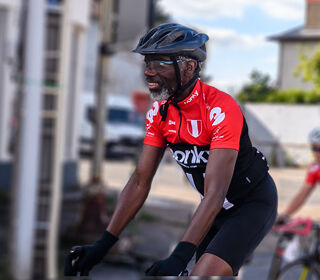
Blog

Associate Professor Andrew Salmon has significant industry experience, having developed a range of marketing and business development workshops which have been attended by over 2,000 SMEs. We spoke with Andrew about his career, what studying at the Business School is like and advice he has for business-minded individuals.
What do you do at BCU and how long have you been part of the University?
I teach within the Department of Marketing and Leisure Economies at the University’s Business School and my areas of expertise include business strategy and digital marketing.
I started my career at BCU as a visiting lecturer in 2014. Immediately prior to this I had been running my own business providing business support on various government programmes. I really enjoyed the work but after just a little exposure to teaching I fell in love with it - it felt as though I had found my calling!
In 2015 I was successful in securing a full-time position as a senior lecturer and in April 2022 I started as Associate Professor for Enterprise & Corporate Development. This is an exciting time for me as I'll be able to use more of my skill set in order to have a greater impact upon our business school.
Could you tell us about your experience and how these feeds into your course/teaching?
I have many years of industry experience, not only here in the UK but also overseas. I spent 15 years living in Australia where I ran my own successful consultancy and after selling that, went on to deliver on some large projects for Australian corporates. I feel that my extensive industry experience really helps in the classroom as I'm able to draw upon numerous real - world business scenarios that I had directly experienced and to use these to demonstrate the application and impact of academic models and frameworks.
What are some of the greatest achievements you have accomplished at BCU?
Most of my biggest achievements at BCU are those that involve my teaching. It's not always about the things that one can measure. Sometimes it's as simple as a comment made by a student that really hits home how much of an impact you're having.
Another big achievement came when I was asked to take over the lead of a business-facing support programme being delivered with a partner institution. Being responsible for making some strategic decisions, overseeing the implementation, and then seeing the results has been a great experience.
Another unforgettable experience happened at the end of summer last year - I was asked if I'd represent the business school in a cycle ride from London to Paris on behalf of Cure Leukaemia. There were around 100 participants, and we were able to raise significant amounts of money to help fund ongoing Leukaemia research.
Business School Courses
Find out more about our courses
What makes the courses you teach on distinct and what is the learning environment like?
I teach on different courses at undergraduate and postgraduate level and teach a lot of international students. I really enjoy hearing of their varied experiences in the UK and overseas. The learning environment that I foster in the classroom is that of a problem-based pedagogical approach where students are tasked with applying academic theory to real-world business problems. I'm a strong believer that the real learning starts when I stop speaking and students are discussing and resolving business issues for themselves.
What’s your favourite thing about working at the University?
Picking just one thing is a tough one as there's so much to love about working at the University. If pushed though, I'd probably say that it's working with a great bunch of people, many of which are no longer just colleagues but who I consider really good friends.
Why do you think Birmingham is a good place to study?
Birmingham is a fantastic place to study. Geographically it is in the centre of the country with great transport links, it is a young and vibrant city, packed with diversity and it has some great businesses here so having graduated, students don't have to leave the city to start their career.
What can students do to help prepare them for the courses you teach?
Read the course materials carefully and remember that in the classroom - No question is a silly question!





